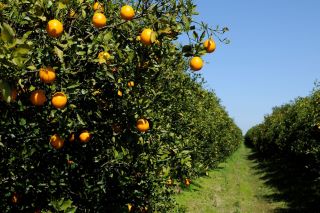PepsiCo Pilots Green Program
 One year after PepsiCo and the Carbon Trust launched an innovative partnership that began with certifying the carbon footprint of Tropicana Pure Premium orange juice, Tropicana is announcing a groundbreaking pilot program that could drastically reduce its lifecycle carbon footprint and have a dramatic impact on the broader agricultural landscape for orange growers and producers of other agricultural products.
One year after PepsiCo and the Carbon Trust launched an innovative partnership that began with certifying the carbon footprint of Tropicana Pure Premium orange juice, Tropicana is announcing a groundbreaking pilot program that could drastically reduce its lifecycle carbon footprint and have a dramatic impact on the broader agricultural landscape for orange growers and producers of other agricultural products."This pilot program is an example of how PepsiCo is working hand-in-hand with our suppliers to find innovative ways to make our agricultural practices more environmentally sustainable," says Indra Nooyi, chairman and CEO of PepsiCo. "As a company that relies on the Earth's natural resources to make our products, we are keenly focused on reducing our carbon footprint wherever we can. If this test is successful, it could positively impact growing practices far beyond our business alone."
When Tropicana measured the carbon footprint of its Pure Premium product's lifecycle, it discovered that the largest single source of carbon emissions - approximately 35 percent - was fertilizer use and application for the growing process. To tackle this issue head-on, PepsiCo and its Florida suppliers are testing multiple creative approaches using reduced-carbon fertilizers. Specifically, Tropicana, in tandem with one of its long-time growers, SMR Farms in Bradenton, Fla., is launching a pilot study to test two alternative fertilizers to determine whether using either could significantly reduce the carbon footprint associated with the agricultural production of oranges. If successful, this change could reduce the total carbon footprint of Tropicana Pure Premium by as much as 15 percent. SMR Farms will test lower-carbon fertilizers produced by Yara International ("Yara"), the world's largest fertilizer producer, and ERTH Solutions, a wholly owned subsidiary of Toronto-based Outlook Resources, which provides low-carbon fertility solutions.
